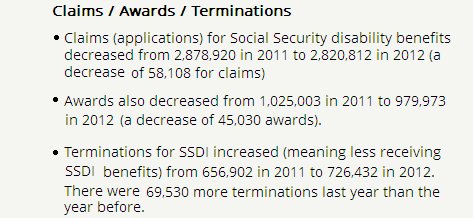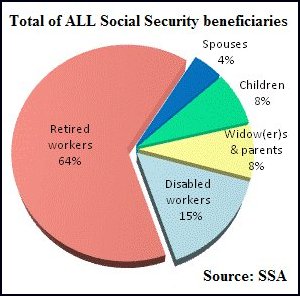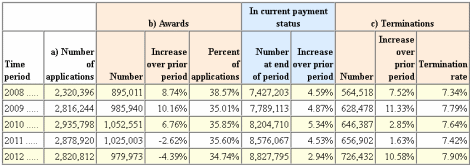From FY2011 to FY2012 (in the aftermath of the Great Recession) it was reported that there were actually less Social Security disability claims, less awards and more SSDI terminations. By the end of 2012, total disabled workers receiving SSDI benefits numbered 8.8 million --- not 14 million that the NPR consistently reports.
NOTE: This post is about SSDI only --- not SSI.
SSDI (Social Security Disability Insurance) is an earned benefit that is funded by Social Security taxes paid by workers. Benefits are paid to people with physical and mental impairments that are severe enough to prevent them from working. SSDI dates to 1960 when Social Security's rules were amended to permit payment of benefits to disabled workers of any age, as well as to their dependents. These benefits are based on a person's work record, the same as regular retirement benefits.
SSI (Supplemental Security Income) pays an unearned benefit to low-income people who are 65 or older and/or to adults who are disabled (based on the same definition used by SSDI). The program is only for people who have very limited income and assets. SSI is financed by general revenues that the Treasury Department collects to run the U.S. government. SSI benefits have never been tied to a person's work record. As of 2012, SSI paid an eligible individual $698 a month. But as of June 2013, SSI pays an eligible individual an average of $527.22 a month. (The maximum amount is $710)
Regarding SSDI:
- By the end of George W. Bush's term in 2008 there were 7,427,203 disabled Americans on SSDI --- and by the end of 2012 there were 8,827,795 receiving monthly SSDI benefits.
- Over the span of four years during Obama's first term as President (2009, 2010, 2011 and 2012) there was a net gain of 1,400,592 Americans on SSDI (for an average net gain of 350,148 people per year added to the SSDI rolls.)
- In the aftermath of the Great Recession, from 2011 to 2102, there were actually less Social Security disability claims, less awards and more terminations.

- From 2011 to 2012 the net number of disabled workers receiving disability benefits rose by only 251,728
- By the end of 2012, total disabled workers numbered 8.8 million and had an average monthly benefit of $1,130.34
- 50% of disability beneficiaries were between the ages of 56 and 66.
- The NPR has falsely and consistently reported that there are 14.0 million disabled workers.
The Media on the Disability Numbers
Gary Evan Knell, the president and CEO of the NPR, may or may not be personally responsible for waging NPR's war on disabled Americans --- possibly in an attempt to influence pubic opinion by consistently reporting false statistics and skewing the data regarding SSDI beneficiaries. This is something we may have once expected from the Republican Party, those who passed a bill in Congress to de-fund the NPR. But now it appears that the NPR and the GOP are mutual friends, and they also seem to have a common enemy --- disabled American workers. The NPR has repeatedly reported that there are 14 million disabled workers.
- The NPR reported in this article: "Every month, 14 million people now get a disability check from the government."
- The NPR reported in this article: "The number of workers on disability has been doubling every 15 years or so. It has now reached that 14 million number."
- The NPR reported in this article: "These 14 million Americans don't have jobs, but they don't show up in any of the unemployment measures that we use. They receive federal assistance, but are often overlooked in discussions of the social safety net."
- The NPR reported in this article: "There are now 14 million people receiving benefits from the federal government because their disabilities make it hard for them to work."
At the Daily Kos Jennifer Kates writes a couple of comprehensive articles about the NPR's war on the disabled, about Social Security disability and the politics behind it.
Last year on Fox News even Bill O'Reilly (who hates all government entitlement programs) got the actual number right: "That number is a record 8,733,000 workers on disability." But then again, he could have also said that were a record number of people living in the United States. And his point was?
Then he goes on to say, "So why has the disability rate increased more than 100 percent? I'll tell you why. It's a con. It's easy to put in a bogus disability claim." But Mister O'Reilly doesn't differentiate between a "claim" and an actual "award". And not everybody can put in a claim. And anybody who has gone through the experience knows very well that pursuing a claim isn't easy at all.
As with lies, damned lies, and statistics --- people will use them to make their own argument. O'Reilly could have also said that the number people who retired on Social Security doubled too. If one goes back far enough, everything went up 100%. My age increased over 100% in the past 25 years. So what.
After O'Reilly reported 8,733,000 workers on disability, the Social Security Administration later reported that there were 8,827,795 (Source: Social Security Administration. Choose "disabled workers"). But the NPR consistently reports 14 million. Why? Even if one were to give the NPR the benefit of the doubt --- besides counting JUST disabled workers, if one were also to include disabled widows(ers), spouses of disabled workers, and children of disabled workers, the total number would still be less than 14 million --- it would be 11.1 million. Why doesn't the NPR just include all the retirees as well?
And even if there were 14 million disabled Americans, so what. Shouldn't they all be compensated after becoming disabled and can no longer work? Shouldn't the unemployed also receive jobless benefits? Shouldn't the poor also receive food stamps and Medicaid? Shouldn't the elderly also receive Medicare and Social Security? If not, then what makes America any different than any other despotic country?
Aren't the disabled allowed to live? Especially older workers and those who worked all their lives in labor-intensive jobs to help make those on the Forbes Fortune 400 List so rich. 50% of those receiving SSDI are between the ages of 56 and 66 --- so they are already nearing early or regular retirement age anyway. Is it their fault that they couldn't manage to make it to the finish line in the home stretch of their working careers?
As it is now, according to the Social Security Administration, 50% of all U.S. wage earners (who filed a W-4 with an employer and paid FICA taxes) earned $26,965 a year or LESS. Those receiving disability benefits averaged only $13,564 a year, whose cost-of-living adjustments may be subjected to chain-CPI, giving them less to live on (unlike the way COLAS are calculated for Congressional salaries of $174,000 a year).
And speaking of those wage earners just mentioned: They pay Social Security taxes on 100% of their earnings, whereas, anyone earning $113,700 a year or more don't pay any Social Security taxes at all on earnings over that amount. And people with unearned income (such as with capital gains income on stock options) aren't taxed at all for Social Security.
One example would be the CEO of Oracle, Larry Ellison, who received stock options worth $90.7 million last year, and will pay a capital gains tax of 20% --- but will pay no Social Security taxes at all on that income. But a single individual wage earner (such as Larry Ellison's secretary) with an adjusted gross income of $36,250 will have a tax rate of 25% and pay Social Security taxes on 100% of her earnings. Does that sound fair and equitable?
Senator Tom Harkin (D-IA) has proposal a bill to fix this, The Strengthening Social Security Act of 2013 that phases out the current taxable cap of $113,700 so that payroll taxes apply fairly to every dollar of wages. MoveOn.Org and other organizations (not conservative ones) have petitions on line to improve and expand the Social Security system (which, by the way, has nothing to do with the deficit. The Social Security trust fund is financed from payroll taxes).
UPDATE: July 25, 2013 - Senators Tom Harkin and Mark Begich will be on MSNBC on The Ed Show Saturday July 27, 2013 at 5 p.m. Eastern to introduce their plan to strengthen and expand Social Security to viewers nationwide. Senators Harkin and Begich have introduced bills in the U.S. Senate that would increase Social Security benefits for generations to come while ensuring that the increased benefits could be paid for by making millionaires and billionaires finally pay their fair share of Social Security taxes.
|
|
Counting JUST disabled working-aged Americans (those that the NPR and Fox News insinuates are lazy and would rather receive poverty-level benefits rather than working), the number is 8.8 million for those keeping score --- not 14 million. |
See all the data and charts further below from the Social Security Administration with direct links to sources.
| The Correlation between Disability, Unemployment Benefits, Older Workers and Available Jobs
A Congressional Budget Office study says that when opportunities for employment are plentiful, some people who could qualify for disability benefits find working more attractive. Conversely, when employment opportunities are scarce, some of those people participate in the disability program instead. Indeed, applications to the program increased -- during and immediately following the recessions that occurred in the early 1990s, in 2001, and over the past few years --- as did the number of people receiving disability benefits. Stephen Goss, chief actuary of the Social Security Administration, acknowledged that when employers are hiring lots of people, disabled people (just like any one else) also finds it easier to land a job Last year the Wall Street Journal also reported that many desperate Americans may be seeking refuge in the disability program as a last resort after their unemployment insurance and savings run out. But earlier this year, in a new study by Jesse Rothstein (University of California, Berkeley and NBER) found that there was "no indication that expiration of UI benefits causes DI applications." Last year the Congressional Budget Office also did study on this subject, and according to the Huffington Post, had found that "The rise in America's ranks of disabled stems from an aging population, a surge in women workers, changes in the law in the 1980s and a terrible economy in which disabled people can't find jobs" and that "the biggest jump in the disabled population came from aging Baby Boomers." Now the Wall Street Journal is acknowledging Jesse Rothstein's study: "The sharp rise in federal disability rolls in recent years has sparked worry that able-bodied workers are using the system to hide from the weak job market. But new research suggests those fears may be overblown." Another study says, "As the U.S. population grows older, the number of years Americans can expect to live with disability from causes such as depression and low back and neck pain has increased." Also, a Congressional hearing on the long-term unemployed determined that too many older workers who were laid off during the Great Recession haven't been offered jobs, and still remain long-term unemployed. And that doesn't even account for a lack of jobs in general ( 3.1 unemployed for every job opening). The Wall Street Journal reports that not enough people are quitting their jobs --- that there's not enough churn in the work force, when an employee voluntarily leaves one job for another in search of a higher paying job and new challenges. And of the jobs that have been created lately, restaurants and bars have done the bulk of hiring with younger people in part-time low-paying jobs. In conclusion: After the greatest economic (man-made) disaster since the Great Depression, it's times to stop scapegoating older Americans who need disability assistance. Pick on the ultra-wealthy, those who have the means to fight back. |
Data From the Social Security Administration
| Applications (claims) | Awards (added) | Terminations (subtracted) | Total Disabled | |
| 2011 | 2,878,920 | 1,025,003 | 656,902 | 8,576,067 |
| 2012 | 2,820,812 | 979,973 | 726,432 | 8,827,795 |
| Difference | 58,108 less | 45,030 less | 69,530 more | 251,728 |
Social Security Administration - Benefits Paid by Type of Beneficiary for "Disabled worker" for the last 5 years (annual numbers) -- Source: http://www.ssa.gov/oact/ProgData/icp.html --- There was a net gain of 251,728 from 2011 to 2012 who received Social Security disability benefits
| End of year | Number | Average amount |
| Dec 2008 | 7,427,203 | $1,063.14 |
| Dec 2009 | 7,789,113 | $1,064.31 |
| Dec 2010 | 8,204,710 | $1,067.79 |
| Dec 2011 | 8,576,067 | $1,110.51 |
| Dec 2012 | 8,827,795 | $1,130.34 |
Disabled worker beneficiary statistics by calendar year -- Source: http://www.ssa.gov/oact/STATS/dibStat.html
For 2012: 2,820,812 applications (claims) -- 979,973 awards (approvals) -- 726,432 terminations (stopped receiving SSDI benefits) = a net gain of 253,541 for 2012.
Claims / Awards / Terminations --- Claims for SS disability decreased from 2,878,920 in 2011 to 2,820,812 in 2012 (and decrease of 58,108 for claims), and actual awards also decreased from 1,025,003 in 2011 to 979,973 in 2012.
Terminations also increased (meaning less received SSDI benefits) from 656,902 in 2011 to 726,432 in 2012 (there were 69,530 more terminations).
a) The number of applications is for disabled-worker benefits only and, as such, excludes disabled child's and disabled widow(er)'s benefits. Applications ultimately result in either a denial or award of benefits. These counts include applications that are denied because the individual is not insured for disability benefits. b) Award data are unedited and may contain duplicates. c) The number of terminations is the number of beneficiaries who leave the disability rolls for any reason.
Disabled workers: 8,827,795 Average monthly benefit: $1,130.34 (50% are between the ages of 56 and 66) -- Source: http://www.ssa.gov/oact/ProgData/byage.html
Disabled workers and dependents: 10,614,398 --- Counting dual-entitled beneficiaries --- If a beneficiary is entitled to both a primary benefit (as a retired or disabled worker) and another benefit (say a spousal benefit) payable from the same trust fund, then he or she is counted only once in our statistics as a primary beneficiary.




Comments
nice call out with statistics!
I just checked the SSA database for disabled and no where can I come up with 14 million or even close, so this is a great call out on reality with numbers.
Population increases and also ages and as a result we should see proportionately the number of people on disability increase. More people, more people who become or are disabled.
You can rant away on this site as long as the numbers are accurate that one is ranting over!
I never checked this, there is so much media spin out there with inaccurate figures and I never bothered to look it up, so thanks for writing about this.
Notice how these people prey on the weak, vulnerable, powerless and the sick? What do predators in the wild do?
What About SSI?
My guess is the 14 million includes both people receiving the SSDI and SSI, which is also a disability program.
Unfortunately due to Iraq and Afghanistan wars the number of former military people receiving disability would have greatly increased, I am sure. Maybe that number was included, if the 14 million was the number of Americans receiving government disability benefits.
good catch!
Here are the SSI statistics and they are two separate programs.
May 2012 disabled SSI = 7,154,651.
2000 disabled SSI = 5,312,347
have to calculate total population and ratios to see if any real increase beyond attributable to normal population growth.
UPDATE _--------------------
"U.S. seniors are more likely to be in the workforce than their peers in almost every other developed country. Nearly 30 percent of Americans ages 65 through 69 were employed in 2012. That’s about three times the European average, according to the Organization for Economic Co-operation and Development."
http://www.offthechartsblog.org/u-s-seniors-are-a-hard-working-bunch/
age 65-69 are working
Because they were wiped out of their retirement and Americans plain work hard. People live so much longer seems ridiculous if one is in good health to not work past 65 as well.
America has an age problem alright, an age discrimination problem.
Some jobs just crush people over the years
I think it's great when people want to work hard and as long as they want, but so many people now have to work long past the time they thought they could retire (that's if they can get hired). It's insane when some fat slob politician says people are too lazy to work or they should just suck it up and work until whenever. I've seen plenty of jobs filled by people at every age, but many, many jobs are tough on the body and just become impossible after years and years. People of all ages can do them (the mind and body can tolerate huge amounts when necessary), but one accident, one fall from a height, one bout of arthritis and some jobs are actually impossible to do. What are people supposed to do then? Too old or injured to work anymore and no sympathy from politicians after years of hard work. When a pudgy politician or teleprompter reader is forced to hobble around on a jobsite with screwed up knees or after breathing in coal dust for decades or is working on a rig 50 miles off the coast with screws in his back, they might care just a wee bit more, until then, they are clueless.